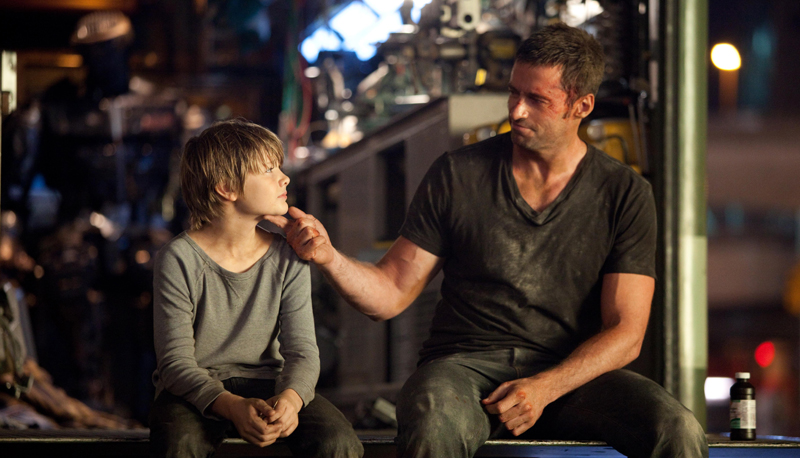At the beginning of Director Shawn Levy’s “Real Steel” there’s no doubt that its protagonist, Charlie Kenton, is a loser. He wakes up in a trailer, dodges a call from a man he’s into debt for $30,000, and takes a sip of beer. However, his profession’s cool enough, and that garners some genuine interest for his situation, and enough sympathy to keep us interested.
Hugh Jackman (“X-Men,” “Someone Like You”) plays Kenton, once championship boxer and struggling fight promoter in a new era where human fights have been replaced by that of robots. Large, 1-ton creations, operated by man, are the new sport. “Human bodies are frail,” he says in one scene. “The fights couldn’t get brutal enough.”
The movie also boasts a futuristic look: cell phones that look like holograms, cities with tall, sleek glass, and fight arenas that modern boxers would be envious of. “Real Steel” wants you to know its from the future. However, its emotions are real, and strikes a more contemporary chord with its victories…and its losses. Kenton gets into a couple of high-stakes fights with his robot, loses, and with loan sharks on his tail, things are looking bleak as ever.
In the midst of this, Kenton gets a surprise visit from two gentlemen proclaiming that his ex-girlfriend has died, leaving behind she and Kenton’s 11-year-old son, Max. While Kenton knows of his son’s existence, it’s clear he doesn’t know much about him and isn’t interested in getting involved in his life. He shows up in town to sign the papers to release custody of Max to his ex-girlfriend’s sister and her husband. However, the two have a trip to Italy planned, and, for the added bonus of $50,000, Kenton agrees to watch Max for the summer before he turns over custody to the couple.

Max (played by Dakota Goyo), does a great job as Charlie’s spunky son, who’s as stubborn himself as Charlie. “How much did you sell me for?” When Charlie tells him $50,000, he doesn’t respond hurt, but economical: “I want half.”
However, as is most of the world, Max is enamored with the world of Robot fighting. The two lose another Robot battle when Charlie gets in over his head, and find themselves scrapping through a junk yard looking for “anything I can put a robot together with,” as Charlie says. Like the underdog boxer that he is, Kenton is often out, but just doesn’t know when to stay down.
Hugh Jackman, known more for action and romantic comedies, also does remarkably well here in garnering real human emotion for his character. As he and Max struggle to put together their new found robot “Atom,” (a aged sparring bot with unforgettable blue eyes), the two bond in an unlikely way. Another high point of “Real Steel” is that it avoids the “you abandoned me” histrionics until absolutely necessary, and makes a strong case for father-son reconciliation.
A couple of winning fights puts “Atom” on the league circuit, where he has to face not only tougher competitors, but also conniving businessmen and women who seem threatened by this unsung sparring bot. Owners of the mighty, undefeated robot “Zeus” attempt to buy “Atom,” but to no avail. “He’s not for sale,” Max asserts, and it seems neither is team Kenton. However, a winning bout and a challenge set the stage for “Atom’s” riskiest fight — going head to head with the mighty “Zeus” in front of a sold-out crowd.
 The ending of this movie is so utterly rewarding that more really can’t be said without taking away from it. You’ll root for Charlie and Max, and you’ll root for “Atom.” You’ll find yourself on the edge of your seat during the fight sequences, just hoping that this little bot can do it. And you’ll find yourself seeing if Charlie, who hasn’t done a lot right by his son, can manage to be there for him when it counts.
The ending of this movie is so utterly rewarding that more really can’t be said without taking away from it. You’ll root for Charlie and Max, and you’ll root for “Atom.” You’ll find yourself on the edge of your seat during the fight sequences, just hoping that this little bot can do it. And you’ll find yourself seeing if Charlie, who hasn’t done a lot right by his son, can manage to be there for him when it counts.
“Real Steel” is an underdog movie. It’s an honest movie. Its emotions are real and its characters believable. And with good acting, a solid story, and edge-of-your-seat suspense, it’s a love story about the rarest kind of loves: courage, perseverance, and the awe-inspiring, healing power of forgiveness.
– by Mark Ziobro


